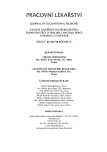-
Medical journals
- Career
Mobbing – an important negative psychosocial factor in working environment
Authors: K. Wolfová; J. Chaloupka
Authors‘ workplace: Hradec Králové, přednosta doc. MUDr. Jiří Chaloupka, CSc. ; Klinika nemocí z povolání Lékařské fakulty UK v Hradci Králové a Fakultní nemocnice
Published in: Pracov. Lék., 61, 2009, No. 2, s. 56-62.
Category: Original Papers
Overview
Pathological working relationships rank among psychological factors of working environment as well as psychosocial stress and mental work load. The paper presents mobbing and bossing and documents their occurrence on the basis of the survey with a Klaus-Biedermann questionnaire on 42 respondents. 40% of women and 33% of men understand the meaning of at least one concept. 17% of persons, most frequently women with secondary education, are directly endangered with pathological relationships at the workplace. The most frequent complaints of respondents include irritability and insomnia, more frequent morbidity and loss of joy from work. Respondents complain about being undermined in their decisions, restricted in free expression of their opinions, forced to work which endanger their selfconfidence, imitated in their behaviour, ignored by their colleagues and assigned meanigless tasks. Resolving the situation is complicated. It is not only the victim who suffers from mental and health difficulties. Also the company is affected due to increased morbidity and fluctuation of employees. The consequences burden the whole society which invests significant resources to treatment of diseases and reinclusion victims into working process.
Key words:
mobbing, bossing, pathological working relationships, mental load, working environment, stress
Sources
1. BENDL, S. Prevence a řešení šikany ve škole. Praha: ISV, 2003, 197 s., ISBN 80-86642-08-9.
2. BEŇO, P. Mobbing je, když... Moderní vyučování, 2002, 8, 3, s. 4–5.
3. BEŇO, P. Můj šéf, můj nepřítel? Brno: Era vydavatelství, 2003, 181 s., ISBN 80-86517-34-9.
4. Dilek, Y., Aytolan, Y. Development and psychometric evaluation of workplace psychologically violent behaviours instrument. J. Clin. Nurs., 2008, 17, 10, s. 1361–1370.
5. Duncan, S. M., Hyndman, K., Estabrooks, C. A., Hesketh, K., Humphrey, C. K., Wong, J. S., Acorn, S., Giovannetti, P. Nurses’ experience of violence in Alberta and British Columbia hospitals. Can. J. Nurs. Res., 2001, 32, 4, s. 57–78.
6. Hecker, T. E. Workplace Mobbing: A Discussion for Librarians. Journal of Academic Librarianship, 2007, 33, 4, s. 439–445.
7. Chen, W. C., Hwu, H. G., Kung, S. M., Chiu, H. J., Wang, J. D. Prevalence and determinants of workplace violence of health care workers in a psychiatric hospital in Taiwan. J. Occup. Health., 2008, 50, 3, s. 288–293.
8. KOLÁŘ, M. Bolest šikanování. Praha: Portál, 2001, 255 s. ISBN 80-7178-513-X.
9. Kratz, H.-J., Pondělíček, J. Mobbing: jak ho rozpoznat a jak mu čelit. Management Press, 2005, 132 s., ISBN 80-7261-127-5.
10. Meseguer, de P. M., Soler Sánchez, M. I., Sáez Navarro, M. C., García Izquierdo, M. Workplace mobbing and effects on workers’ health. Span. J. Psychol., 2008, 11, 1, s. 219–227.
11. Ozturk, H., Sokmen, S., Yilmaz, F., Cilingir, D. Measuring mobbing experiences of academic nurses: development of a mobbing scale. J. Am. Acad. Nurse Pract., 2008, 20, 9, s. 435–442.
12. Pompili, M., Lester, D., Innamorati, M., De Pisa, E., Iliceto, P., Puccinno, M., Nastro, P. F., Tatarelli, R., Girardi, P. Suicide risk and exposure to mobbing. Work, 2008, 31, 2, s. 237–243.
13. ŘÍČAN, P. Agresivita a šikana mezi dětmi: jak dát dětem ve škole pocit bezpečí. Praha: Portál, 1995, 95 s. ISBN 80-7178-049-9.
14. Svobodová, L. Mobbing – nebezpečný fenomén naší doby. Praha: Výzkumný ústav bezpečnosti práce, 2007, 28 s., ISBN: 978-80-86973661 8086973662.
15. Svobodová, L. Nenechte se šikanovat kolegou: mobbing – skrytá hrozba. Praha: Grada Publishing, 2008, 108 s., ISBN 9788024724744 802472474X.
16. Yildirim, A., Yildirim, D. Mobbing in the workplace by peers and managers: mobbing experienced by nurses working in healthcare facilities in Turkey and its effect on nurses. J. Clin. Nurs., 2007, 16, 8, s. 1444–1453.
17. Yildirim, D., Yildirim, A., Timucin, A. Mobbing behaviors encountered by nurse teaching staff. Nurs Ethics., 2007, 14, 4, s. 447–463.
Labels
Hygiene and epidemiology Hyperbaric medicine Occupational medicine
Article was published inOccupational Medicine

2009 Issue 2-
All articles in this issue
- Lyme borreliosis from the perspective of Occupational Medicine – a comparative study
- Mobbing – an important negative psychosocial factor in working environment
- Problems related to occupational infectious and parasitic diseases
- Atopy in patients with allergic contact dermatitis
- Selected harmful substances in rubber-making technologies
- Postgraduate training of assessment doctors in the Czech Republic
- TBC nowadays
- Occupational Medicine
- Journal archive
- Current issue
- Online only
- About the journal
Most read in this issue- Lyme borreliosis from the perspective of Occupational Medicine – a comparative study
- TBC nowadays
- Selected harmful substances in rubber-making technologies
- Atopy in patients with allergic contact dermatitis
Login#ADS_BOTTOM_SCRIPTS#Forgotten passwordEnter the email address that you registered with. We will send you instructions on how to set a new password.
- Career

